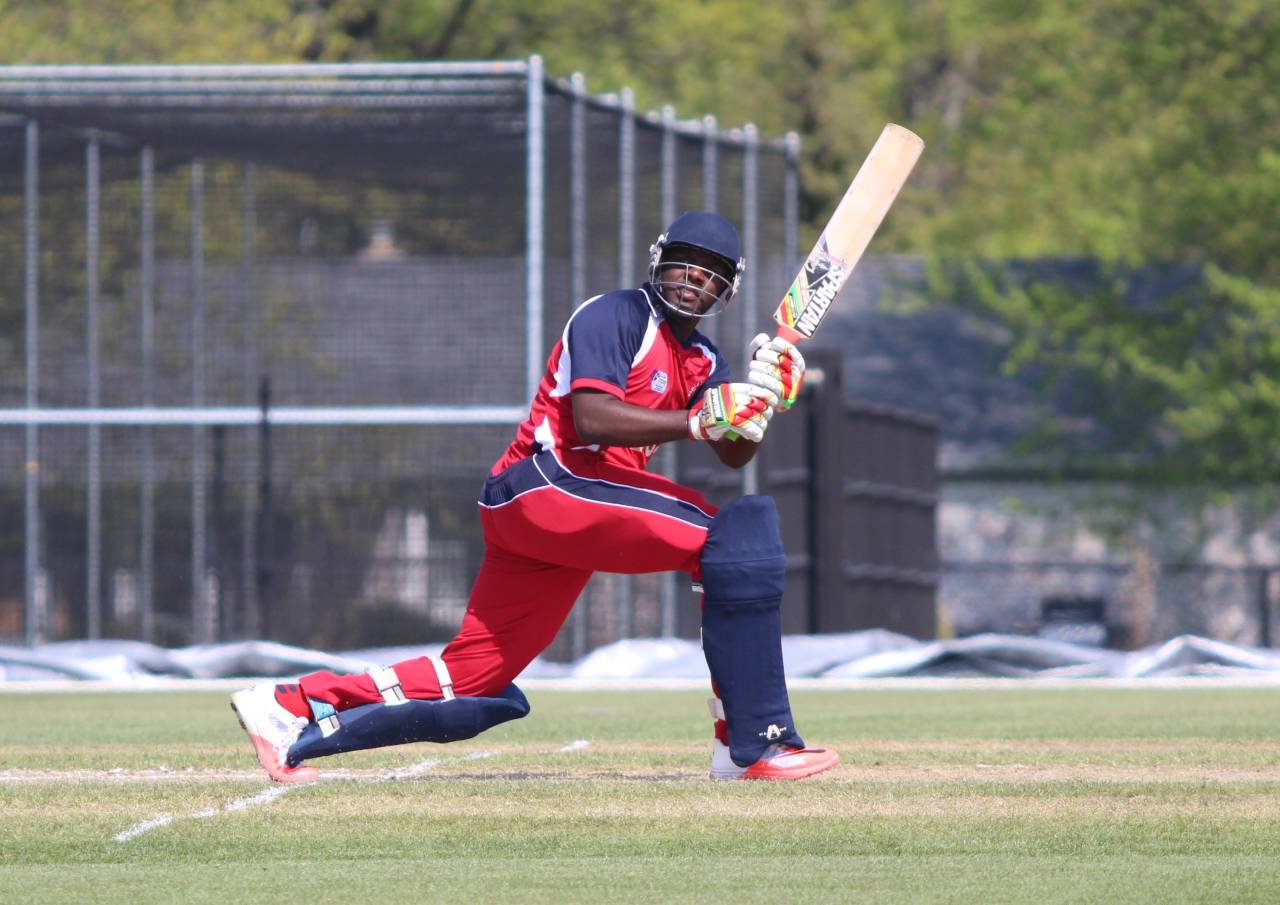Taylor's withdrawal a wake-up call for USA
Steven Taylor's decision to drop out of the USA squad for the World T20 Qualifier in favour of a CPL contract has once again raised questions on the development path for Associate players in USA
Peter Della Penna
Jun 23, 2015, 6:13 PM

The lure of a full-time contract with Barbados Tridents was enough to pull Steven Taylor out of a USA uniform • Peter Della Penna
Wicketkeeper-batsman Steven Taylor's decision to pull out of the USA squad for the forthcoming World Twenty20 Qualifier in favour of a Caribbean Premier League contract with Barbados Tridents should not come as a surprise. It does, however, raise questions on the development path for an Associate player in the USA, and how the players perceive their future within the system.
In the summer of 2013, Taylor had traveled to Jamaica for a training stint with a local club where he told a local media outlet that his dream was to play for West Indies. Taylor, one of the few USA players born and brought up in America, is not the first one to have ambitions of playing for a Full Member. New Jersey's Cameron Mirza, who was the MVP of the ICC Americas Under-19s Division One in 2011, stated not long after that tournament that he was going to university in the UK with an aim to qualify for England on residency and pursue a dream of playing for them. Former USA U-19s captain Greg Sewdial, who made his USA senior team debut at 16, was born to Guyanese immigrants and raised in New York also stated in an interview that his goal was to play for West Indies one day.
There is no proper development structure or career path as an Associate player in the USA for these players to aspire to. In order to be a professional player, it is only natural to look overseas. The limited opportunities to play for USA will only shrink further after next year when the ICC World T20 - the format so many people claim is the gateway to future popularity in the American market - goes from being a biennial event to being played once every four years.
In that sense, the financial aspect of Taylor's decision is significant. Taylor, now 21, dropped out of high school at 19 before completing his senior year, and does not have a regular job like other USA players. His main source of income comes from games in weekend T20 tournaments for private club teams scattered around country. The payment from Tridents, no matter how small, would have been an incentive compared to the stipend for touring with USA.
Part of this also is a failure of the USA Cricket Association and their inability to stick to commitments made to players. Former USACA chief executives Don Lockerbie and Darren Beazley had laid out plans to turn USA's players professional with central contracts, which never materialised. Taylor was part of a USA team that won the WCL Division Four in 2010 in Italy after which they were told they would receive a championship bonus from the board. The players are still waiting for the reward.
After formally announcing a pair of preparation camps in Jamaica for the USA national team ahead of the ICC Americas Qualifier in May and then prior to their departure for Ireland, neither one has happened. USA's players are routinely put under pressure by being asked to show up without any preparation against teams that are similarly talented but have far better support mechanisms in place.
Taylor has also developed a very beneficial relationship with Robin Singh, after the latter took over as coach and technical director of USA's various national teams in 2011. Their familiarity could have played a role in Taylor being assigned to Barbados Tridents, a team Singh coaches, for a CPL tryout following a December camp with an ICC Americas development squad. Taylor secured a full contract with the franchise, while Canada's Nikhil Dutta, who was also among the shortlisted players from the development squad, won a contract with St Kitts and Nevis Patriots.
Singh's connection could present a conflict of interest. He has been working for USACA for the last four years to help raise the standard of the USA national team. Last week, five USA players, including Taylor joined a Tridents training camp on Singh's invitation as part of their own preparation ahead of the World T20 Qualifier. Taylor's decision to withdraw, however, has crippled USA's chances of succeeding in Ireland, with the side deprived of their batting leader.
Another issue is Taylor's playing role with the Tridents compared to his status with the USA squad. Taylor is USA's marquee player, one of the most feared big hitters in the Associate world and would have been assured of opening the batting in every game he played. Now he has gone from being the first name on the team sheet to, in all likelihood, riding the bench for Tridents. If the goal is for Taylor to continue developing his game and get better experience in different conditions, it might be better served by being on the field consistently instead of being limited to net sessions and watching from the sidelines.
In the end, though, if spending one season on the Tridents bench as an apprentice is parlayed into several seasons in the starting XI, Taylor's decision would seem wise. That it comes in the week that the ICC is deciding on USACA's fate at the annual conference in Barbados also serves as a wake-up call to where the players see the future of cricket in the country heading.
Peter Della Penna is ESPNcricinfo's USA correspondent. @PeterDellaPenna